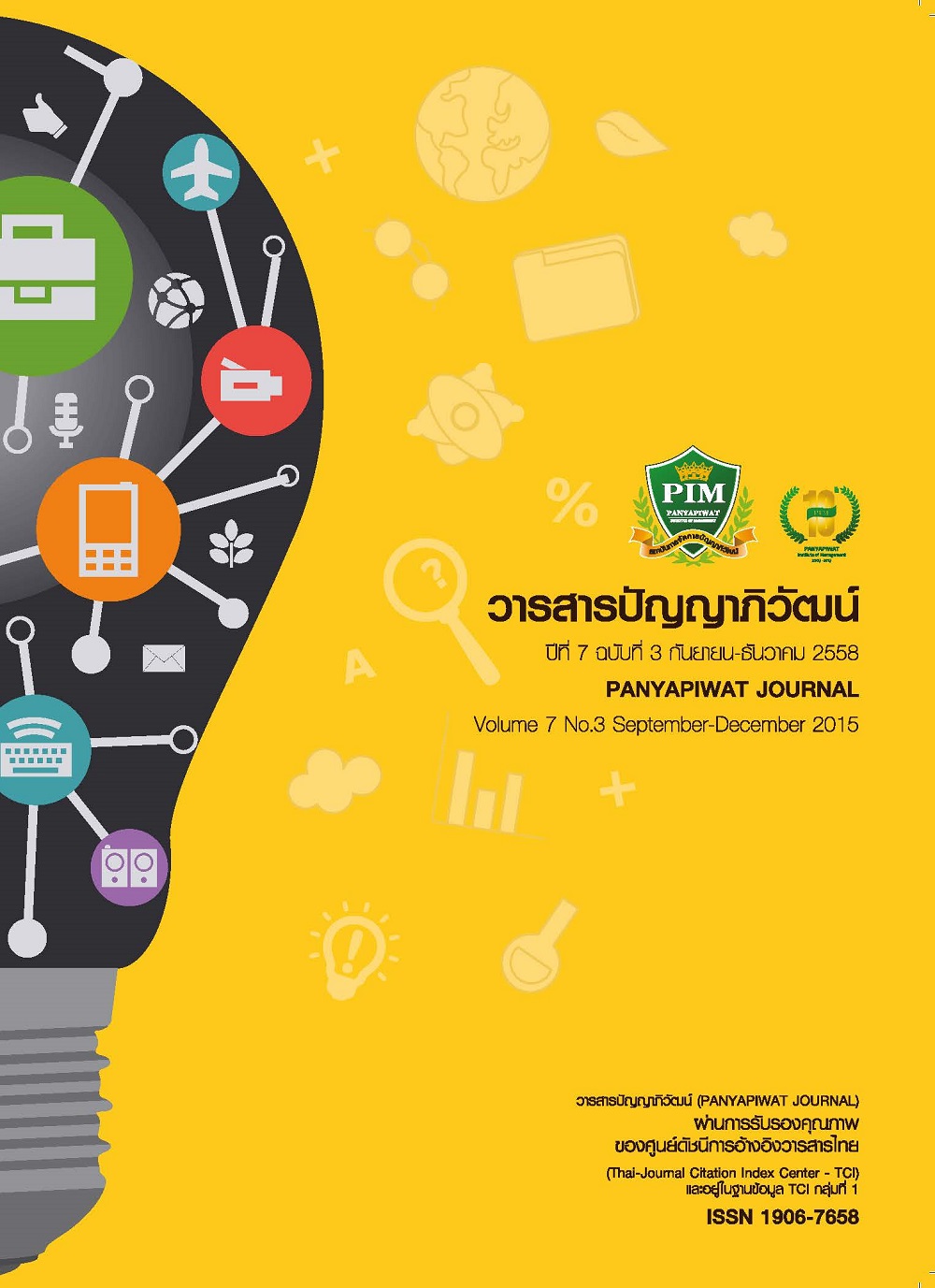家族企业跨代创业:基于多案例研究的因素模型
Main Article Content
บทคัดย่อ
跨代创业研究将传承与创业进行了结合,为家族企业研究指出了新的方向。在中国国内尚缺乏对于跨代创业的深入研究,尤其是通过多案例深入探索影响跨代创业的因素。我们通过分析三家中国家族企业二代CEO访谈数据,构建了在中国情境下跨代创业的影响因素模型。研究发现与识别了跨代创业的双重动机以及影响跨代创业行为与决策的经验学习因素、家庭文化因素、负向影响因素等,为在中国情境下进一步深入研究家族企业跨代创业提供了一些未来研究的建议,同时也为家族企业传承和创业实践提供了一些理论上的参考。
Transgenerational entrepreneurship opens a new direction for family business research by combining succession and entrepreneurship research of family firms. Deeper understanding about transgenerational entrepreneurship, especially about the factors which may affect transgenerational entrepreneurship still not ideal in China, let alone the multiple case studies. We try to construct a factor model of transgenerational entrepreneurship in Chinese context after analyzing the interview data of three CEOs. The entrepreneurial motivation, experiential learning, family culture and “negative” factors among others are found and identified that can influence transgenerational entrepreneurship. These findings show some directions for further research of transgenerational entrepreneurship in family firms under the specific Chinese context, as well as some theoretical insights on succession and entrepreneurship of family firms.
Article Details
“ข้าพเจ้าและผู้เขียนร่วม (ถ้ามี) ขอรับรองว่า บทความที่เสนอมานี้ยังไม่เคยได้รับการตีพิมพ์และไม่ได้อยู่ระหว่างกระบวนการพิจารณาลงตีพิมพ์ในวารสารหรือแหล่งเผยแพร่อื่นใด ข้าพเจ้าและผู้เขียนร่วมยอมรับหลักเกณฑ์การพิจารณาต้นฉบับ ทั้งยินยอมให้กองบรรณาธิการมีสิทธิ์พิจารณาและตรวจแก้ต้นฉบับได้ตามที่เห็นสมควร พร้อมนี้ขอมอบลิขสิทธิ์บทความที่ได้รับการตีพิมพ์ให้แก่สถาบันการจัดการปัญญาภิวัฒน์หากมีการฟ้องร้องเรื่องการละเมิดลิขสิทธิ์เกี่ยวกับภาพ กราฟ ข้อความส่วนใดส่วนหนึ่งและ/หรือข้อคิดเห็นที่ปรากฏในบทความข้าพเจ้าและผู้เขียนร่วมยินยอมรับผิดชอบแต่เพียงฝ่ายเดียว”
เอกสารอ้างอิง
陈文婷,(2011). 创业学习与家族企业跨代企业家的创业选择,经济管理,(8), 38-50.
陈文婷(2012). 家族企业跨代际创业传承研究——基于资源观视角的考察,东北财经大学 学报,(4),3-9.
陈文婷,(2013) 创业学习与家族企业跨代创业成长——基于行业,规模及成长阶段的差异 分析,经济管理,12,008.
陈文婷,(2014). 创业学习一家族企业跨代创业成长机理研究,北京:科学出版社.
费孝通,(2007). 乡土中国上海:上海人民出版社.
郭超,(2013),子承父业还是开拓新机——二代接班者价值观偏离与家族企业转型创业,中山大学学报:社会科版,53(2),189-198.
梁毓溪,(2011). 中国文化要义, 上海:上海人民出版社.
李新春,何轩, &陈文婷(2008). 战略创业与家族企业创业精神的传承 ——基于百年老字号李锦记的案例研究,管理世界,(10),127-140.
Barkema, H. G., Chen, X. P., George, G., Luo, Y. & Tsui, A. S. (2015). West meets East: New concepts and theories. Academy of Management Journal, 58(2), 460-479.
Chen, M. J. & Miller, D. (2010). West meets East: Toward an ambicultural approach to management.
The Academy of Management Perspectives, 24(4), 17-24.
Chua, J. H., Chrisman, J. J. & De Massis, A. (2015). A closer look at socioemotional wealth: Its flows, stocks, and prospects for moving forward. Entrepreneurship Theory and Practice, 39(2),173-182.
Chua, J. H., Chrisman, J. J. & Sharma, P. (1999). Defining the family business by behavior. Entrepreneurship Theory and Practice, 23, 19-40.
Eisenhardt, K. M. (1989). Building theories from case study research. Academy of Management Review, 14, 532–550.
Glaser, B. & Strauss, A. (1967). The discovery of grounded theory: Strategies for qualitative research.London: Weidenfeld & Nicholson.
Gómez-Mejía, L. R., Haynes, K. T., Núñez-Nickel, M., Jacobson, K. J. & Moyano-Fuentes, J. (2007). Socioemotional wealth and business risks in family-controlled firms: Evidence from Spanish olive oil mills. Administrative Science Quarterly, 52(1), 106-137.
Gómez-Mejía, L. R., Cruz, C., Berrone, P. & De Castro, J. (2011). The bind that ties: Socioemotional wealth preservation in family firms. The Academy of Management Annals, 5(1), 653-707.
Habbershon, T. G., Nordqvist, M. & Zellweger, T. (2010). Transgenerational entrepreneurship. In Transgenerational entrepreneurship: Exploring growth and performance in family firms across generations. Elgar, Cheltenham, 1-38.
Maslow, A. H. (1975). Motivation and personality. Harper & Row.
Miles, M. B. & Huberman, A. M. (1984). Qualitative dataanalysis. Beverly Hills, CA: Sage.
Yin, R. K. (1984). Case study research-Design and methods. Thousand Oaks, CA: Sage.
Zellweger, M. T., Nason, R. S. & Nordqvist, M. (2012). From longevity of firms to transgenerational entrepreneurship of families introducing family entrepreneurial orientation. Family Business Review, 25(2), 136-155.
Zellweger, T., Mühlebach, C. & Sieger, P. (2010). How much and what kind of entrepreneurial orientation is needed for family business continuity? In Transgenerational entrepreneurship: exploring growth and performance in family firms across generations. Elgar, Cheltenham, 195-214.
Translated Chinese References
Chao, G. (2013). Inheriting or exploring: Valuedeviation of the second generation and the entrepreneurship of family firms. Journal of Sun Yat-Sen University (Social Science Edition),53(2), 189-198. [in Chinese]
Shuming, L. (2011). The essence of Chinese culture. Shanghai: Shanghai Renmin Press. [in Chinese]
Wenting, C. (2011). Entrepreneurial learning and entrepreneurship choice of trans-generational entrepreneurs in Chinese family firms. Economic Management, (8), 38-50. [in Chinese]
Wenting, C. (2012). Trans-generational entrepreneurship in family firms: research from resource based view. Journal of Dongbei University of Finance and Economics, (4), 3-9. [in Chinese]
Wenting, C. (2013). Entrepreneurial learning and trans-generational growth of family firms: Variance analysis based on different industry, scale and growth stage. Economic Management, 12,008. [in Chinese]
Wenting, C. (2014). Entrepreneurial learning: Mechanisms of trans-generational entrepreneurship and growth of family firms. Beijing: Science Press. [in Chinese]
Xiaotong, F. (2007). The rural China. Shanghai: Shanghai Renmin Press. [in Chinese]
Xinchun, L., Xuan, H. & Wenting, C. (2008). Starting an undertaking in terms of strategy, and the succession of entrepreneurialism of clannish firms: A case study based on Lee Kum Keea century-old shop. Management World, (10), 127-140. [in Chinese]


